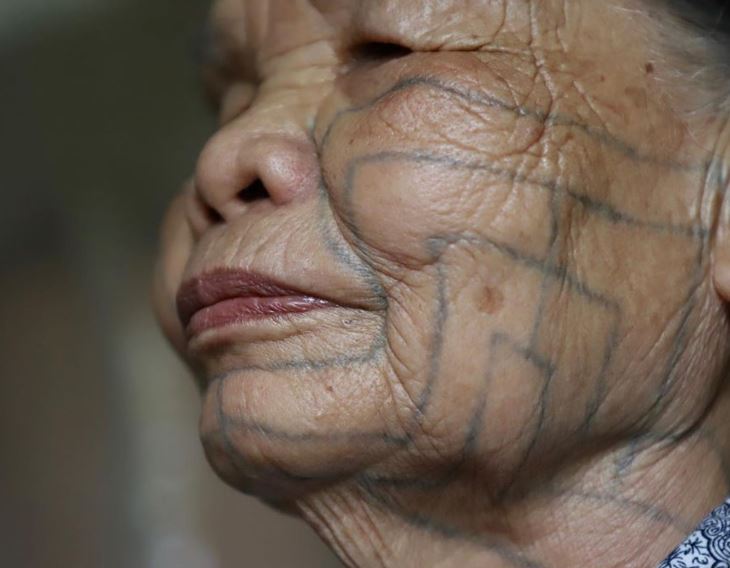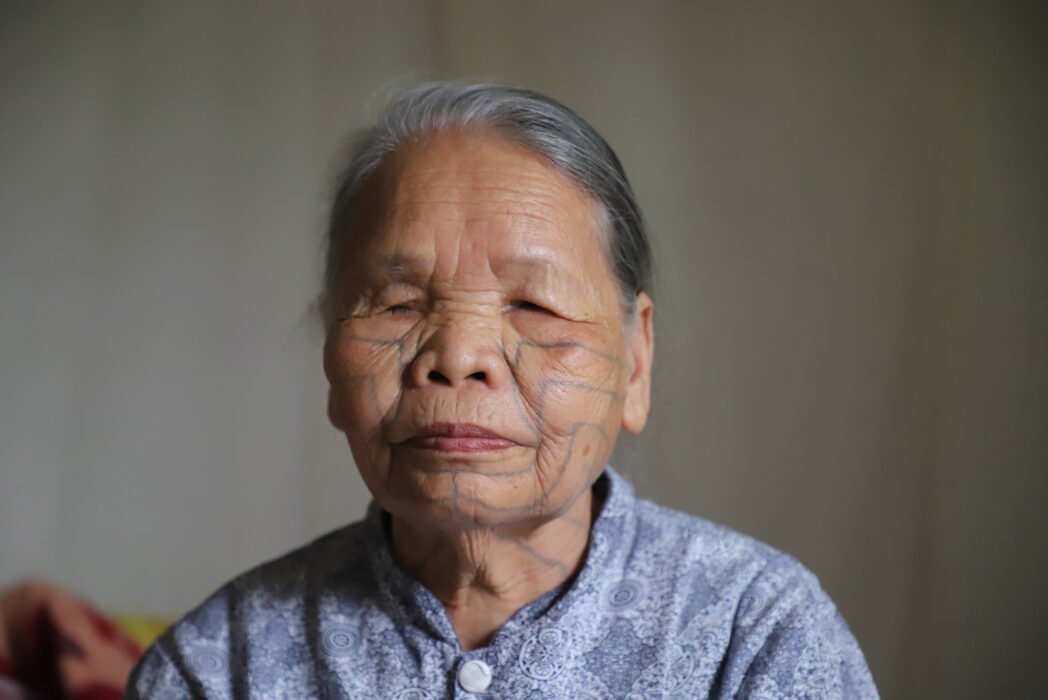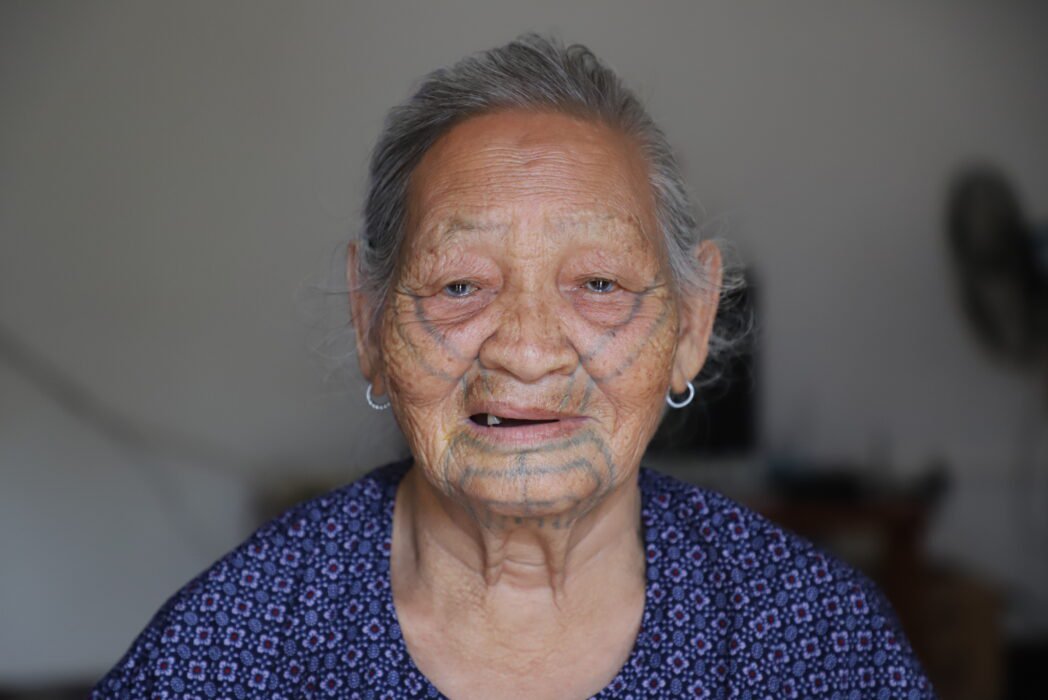ปัจจุบัน “รอยสัก” นั้นได้กลายเป็นส่วนหนึ่งของการแสดงออกทางศิลปะ แต่หากย้อนกลับไปนั้น รอยสักไม่ได้มีความหมายเพื่อความสวยงามเพียงอย่างเดียว แต่อาจจะเป็นเพราะวัฒนธรรมหรือพิธีกรรมประจำชนกลุ่มน้อย
เช่นเดียวกับชนกลุ่มในประเทศจีน อย่างชนกลุ่มน้อยเผ่าหลง ,เผ่าไต หรือเผ่าหลี

เรื่องพิธีกรรมของชนเผ่าดังกล่าวเป็นที่น่าสนใจและทำให้ Cameron Hack ช่างภาพและคุณครูคนหนึ่ง ตัดสินใจที่จะถ่ายทอดเรื่องราวของผู้หญิง “รุ่นสุดท้าย” ของชนกลุ่มน้อยเผ่าหลี ที่ยอมสักลงใบหน้า
ในปัจจุบันนั้นผู้หญิงที่ยอมจรดน้ำหมึกลงบนร่างกายของชนเผ่าหลีนั้นเหลืออยู่เพียง 5 คนเท่านั้น
โดยแต่เดิมแล้วการสักประจำชนเผ่าหลีนั้น เป็นเหมือนกับสัญลักษณ์การเติบโตเป็นผู้ใหญ่ เพราะจะมีการสักให้กับเด็กผู้หญิงที่โตพอจะแต่งงานได้ ซึ่งแต่ละหมู่บ้านก็มีลวดลายการสักที่ไม่เหมือนกัน

อย่างไรก็ตาม เมื่อเวลาผ่านไป ผ่านไป ความหมายของการสักก็เริ่มเปลี่ยนไป…
หนึ่งในหญิงชราของชนเผ่าหลีที่ Cameron ได้ไปพูดคุยด้วย ได้อธิบายว่าในช่วงสงครามจีน-ญี่ปุ่นครั้งที่สอง ทหารญี่ปุ่นได้ทำ “สิ่งที่เลวร้าย” กับผู้หญิงในชนเผ่ามากๆ
แต่พวกเขาจะไม่ค่อยสนใจผู้หญิงที่มีรอยสัก แถมผู้หญิงที่มีรอยสักยังมีอัตราถูกจับไปขายน้อยกว่าด้วย ทำให้เวลาต่อมา ความหมายของรอยสักจึงแปรเปลี่ยนเป็นสัญลักษณ์แห่งความปลอดภัยและความสวยงาม

หญิงชราได้อธิบายเอาไว้ว่าเธอกับเพื่อนของเธอได้รับรอยสักมาอย่างยากลำบาก เพราะต้องใช้ “หนามของต้นไม้” จุ่มลงในหมึก ก่อนจะใช้ค้อนตอกเพื่อส่งหมึกให้เข้ามาอยู่ใต้ผิวหนังถาวร
แม้ว่ามันจะสร้าง “ความเจ็บปวด” ให้แก่พวกเธออย่างมหาศาล แต่เธอก็ไม่ได้เสียใจที่ทำมันลงไป เพราะ ณ เวลานั้น เธออยากได้รอยสักมากจริงๆ
“มันใช้ประมาณครึ่งวันเพื่อจะสักที่หน้าของฉันเสร็จ และก็อีกครึ่งวันสำหรับขาแต่ละข้าง นอกจากนี้ฉันยังมีรอยสักเล็กๆ ที่นิ้วที่ฉันสักเองอีกด้วย
มันเจ็บมากจริงๆ ฉันร้องไห้อยู่ตลอดเลย แต่ฉันก็ไม่หยุด ฉันต้องไปต่อ เพราะฉันอยากได้รอยสักมากจริงๆ ฉันคิดว่ามันจะช่วยให้ฉัน ‘สวย’ เป็นพิเศษในวัยชรา” หญิงชราวัย 90 ปีกล่าว
https://www.instagram.com/p/ByUjNS5FvKd/?utm_source=ig_embed
“ผู้หญิงส่วนใหญ่ไม่ได้สักเพื่อความสวยงามเพียงอย่างเดียว เรายังต้องการให้พวกเธอปลอดภัย ย้อนกลับไปตอนฉันยังเป็นเด็ก ประมาณอายุ 12 ปี ครั้งแรกที่ฉันได้พบกับทหารญี่ปุ่นในไหหลำ พวกเขามาอาศัยอยู่ที่นี่และทำสิ่งไม่ดีมากมาย
ฉันยังเด็กและยังสุขภาพดีอยู่ เมื่อใดที่ฉันเห็นทหารญี่ปุ่น ฉันก็ยิ่งวิ่งหนีไปซ่อนอยู่ที่ภูเขากับครอบครัวและเพื่อนๆ
พวกทหารญี่ปุ่นจะไม่ค่อยสนใจพวกเด็กผู้หญิงที่มีรอยสัก พวกเขาก็เลยไม่ค่อยมายุ่งกับเรา แต่ก็มีทหารบางคนก็ไม่แคร์เรื่องที่เด็กผู้หญิงจะมีรอยสักหรือไม่อยู่ด้วย” เธอกล่าวต่อ
https://www.instagram.com/p/BxpUPmbli0r/?utm_source=ig_embed
แม้รอยสักจะเป็นสัญลักษณ์ของความปลอดภัย แต่ก็ไม่มีอะไรว่าการันตีว่าจะปลอดภัยจริงๆ
ผู้หญิงหลายๆ ที่ Cameron ได้พูดคุยด้วย ส่วนใหญ่จะเล่าเรื่องที่รอยสักช่วยให้เธอรอดจากความรุนแรง ถูกข่มขืนหรือถูกจับไปขาย อย่างไรก็ตามก็ไม่ใช่ทุกคนที่มีรอยสักจะรอดจากเหตุการณ์ดังกล่าว
มีผู้หญิงคนหนึ่งได้เขาได้คุยด้วยเล่าว่าในชีวิตของเธอ ต้องใช้เวลาร่วมกับครอบครัวที่แตกต่างกันออกไปถึงสามครอบครัว หลังจากถูกคุณลุงจับไปขายตั้งแต่อายุ 12 ปี เพื่อแลกวัว 2 ตัวกับข้าว 1 กระสอบ โดยไม่ได้ถามความเห็นของพ่อแม่ของเธอเลยสักนิด

และพออายุได้ 14 ปี เธอก็ถูกขายอีกครั้งหนึ่ง ในครั้งนี้แลกได้เพียงวัวหนึ่งตัวเท่านั้น แต่ในความโชคร้ายก็ยังมีความโชคดี เมื่อคุณพ่อคนใหม่ของเธอ เป็นคนที่ดูแลเอาใจใส่เธอดีมากๆ
ทั้งนี้เมื่อคุณพ่อคนล่าสุดของเธอป่วยลงขณะที่เธออายุได้ 21 ปี เขาก็ได้บอกกับหญิงสาวว่าหากเขาตายลง ก็ขอให้เธอจงไปตามหาครอบครัวที่แท้จริง จนในที่สุดเธอก็ได้กลับมาพบครอบครัวที่แท้จริงและได้แต่งงานตอนอายุ 24 ปี
https://www.instagram.com/p/BwMoJ-6lEHW/?utm_source=ig_embed
“รอยสักนั้นมีความหมายว่าคุณน่าเกลียด ย้อนกลับไปมันมีคนไม่ดีเต็มไหหลำไปหมด ซึ่งพวกเขาจะลักพาตัวหญิงสาวไปขาย บางคนก็อยากจะข่มขืนเด็กๆ เพื่อสนองความต้องการของตัวเอง รวมถึงทหารญี่ปุ่นด้วย
การมีรอยสักไม่ได้หมายความว่าคุณจะปลอดภัยเสมอไป มันยังคงมีผู้หญิงที่มีรอยสักอยู่บนหน้า แต่กลับถูกข่มขืน ถูกฆ่า และก็ถูกฝังโดยทหารญี่ปุ่น” หญิงผู้โชคดีคนดังกล่าวเล่าถึงประสบการณ์ที่เธอผ่านมา
เรียบเรียงโดย #เหมียวโคบี้
ที่มา Unilad, officialhumansofchina

Leave a Reply
You must be logged in to post a comment.